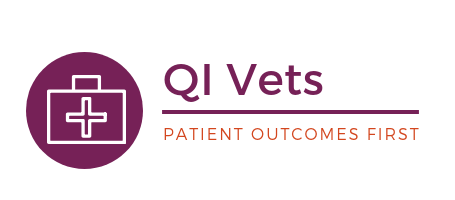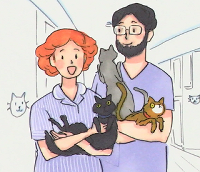QI in action

Welcome to QI Vets! QI Vets is a fictional team, but based on true stories from UK practices, created by the Case Example Working Party to help you apply QI to real situations.
QI Vets has a small animal hospital, a large animal department, an emergency out-of-hours department and is also a training practice. As you can imagine it gets quite busy at times!
The team at QI Vets are passionate about the care they provide, and want to make sure they are doing the best for their patients, clients and colleagues. This doesn't mean they are perfect; mistakes can, and have, happened. Each time an event, or near miss, occurs, the team get together to discuss the incident and make any changes necessary to continuously improve as a whole. When this happens you can read their case example and see exactly how quality improvement benefits real situations.
Inpatient care
When a sick, stray kitten was found, the team worked together to treat his dehydration. However, the patient ended up suffering from fluid overload.
This case example shows how the team came together to find out how this error occurred, and they could do to prevent it from happening again [PDF 500KB] (Published July 2019).
You can also read the case in Vet Times.
RCVS Knowledge (2019) Significant Event Auditing: QI Vets: Fluid Overload. Veterinary Times, 49 (29)
After a patient is given the wrong type of saline on admission, the team perform a significant event audit to find out what happened, and how they could avoid the event from reoccurring [PDF 207KB] (Published December 2020).
You can also read the case in Vet Times.
RCVS Knowledge (2020). Significant event audit: incorrect saline type. Vet Times, 50 (49)
After returning from furlough, the team are overwhelmed and a patient receives the wrong dose of a pre-medication.
This case example shows how the team analysed what had happened and the process they put in place to reduce the risk of other team members making the same error.
You can also read the case in Vet Times.
RCVS Knowledge (2021). Significant event audit: drug calculation error. Vet Times, 51 (6)
Pharmacy
 After a busy morning of emergency surgery, the team notice that the stock and controlled drugs register do not match. This case example shows how the team came together to investigate the discrepancy, and what processes they put in place to prevent it from happening again [PDF 600KB] (Published November 2019).
After a busy morning of emergency surgery, the team notice that the stock and controlled drugs register do not match. This case example shows how the team came together to investigate the discrepancy, and what processes they put in place to prevent it from happening again [PDF 600KB] (Published November 2019).
You can also read the case in Vet Times.
RCVS Knowledge (2019) Significant event auditing part 2. Veterinary Times, 49 (44)
When on a visit to a well-known client and her horse, the team realise that a sedative has been administered instead of a local anaesthetic. This case example shows how the incident was examined, and what procedures were put in place to prevent the same thing happening to another patient [PDF 611KB] (Published April 2020).
You can also read the case in Vet Times.
RCVS Knowledge (2020) Significant event auditing part 3. Vet Times, 20 (16)
The team discuss their systems of work after a near miss is reported in the dispensary. This case example shows the processes that were put in place to prevent the error from occurring again [PDF 618KB] (Published August 2020).
You can also read the case in Vet Times.
RCVS Knowledge (2020) Significant event auditing part 4. Vet Times, 50 (34)
A patient is admitted after being given a 45kg dose of meloxicam instead of a 4.5kg dose. This case example shows the processes the team took to identify how this happened, and how to change to improve patient safety [PDF 519KB] (Published September 2020)
You can also read the case in Vet Times
RCVS Knowledge (2020) Significant event auditing part 5. Vet Times, 50 (36)
After a bulk tank failure after a case of mastitis, the QI Vets team perform a Significant Event Audit to identify what happened [PDF 206KB] (Published December 2020).
You can also read the case in Vet Times
RCVS Knowledge (2020) Significant event auditing part 6. Vet Times, 50 (46)
- Informed consent (CPD: 20 minutes)
This time, a medication is prescribed without obtaining informed consent. This case example will go into more detail about what happened and what the practice did as a result [PDF 503KB] (Published March 2021).
You can also read the case in Vet Times
RCVS Knowledge (2020) Significant event auditing part 7. Vet Times, 51 (4)
Case Example Working Party
The RCVS Knowledge Case Example Working Party consists of Pam Mosedale, Laura Playforth and Angela Rayner.
Updated 03/12/2020


